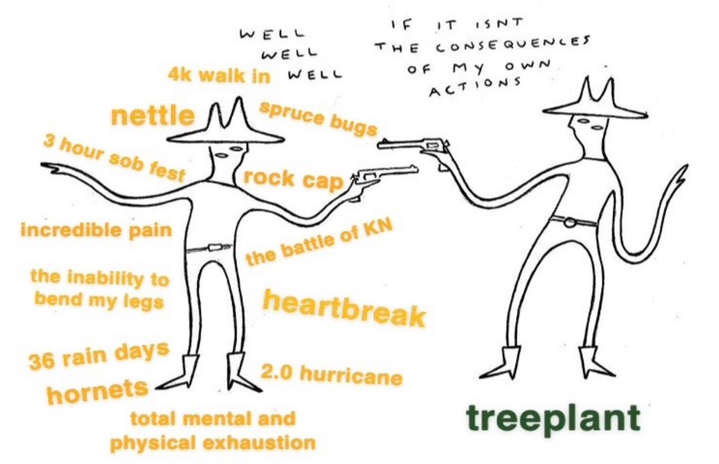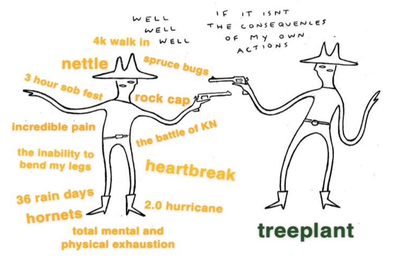It’s 5:30 a.m when my alarm goes off. I’m cold, but I’m warmer in my sleeping bag than anywhere else. The thought of getting out to change haunts me, but time is ticking, so I do it anyway. I try to put my work clothes on while still under the covers, but of course, this doesn’t work. Cold air replaces the warm, and eventually I give up on the idea of making this process any less torturous than it is. Getting out of bed, I put my final layers on and collect my things. As I fiddle with the tent zipper, I notice the early May frost painting shadows on the tent’s thin walls. My breath is white and thick like the fog that looms over the lake, but I take solace in not seeing a pink sky.
It’s hard to be mad knowing what I was getting myself into, but I’m mad anyway; the anger is the only thing keeping me warm. I’m not sure if it’s the sudden increase of exercise or from my muscles contracting all night trying to retain body heat, but my legs can barely move. My idea to stay far from the loud kitchen generator doesn’t seem smart now. The rat race begins, everyone gathers in the mess tent to make their lunch and eat breakfast. Time is counting down fast; at 7 o’clock, either you’re on the bus ready to go, or you’re shit out of luck. Our crew boss honks the bus horn while I wait my turn for the outhouse. I make my visit quick but still hope they’ll forget me behind. Unfortunately, they don’t. I’m the last to take a seat on the bus. As I look forward, I face the scraggily written words “No Bad Days” above the driver. I hate tree planting, but I’m here for my second season and questioning why I’ve come back.
In Canada, there are laws that govern the forestry industry. In an effort to be more sustainable, laws dictate that mills must regenerate harvested forests. Essentially, for every tree logged, one must be planted. “That’s where we come in.” Sebastian, a 3-year veteran planter explains. “Mills will hire us to plant seedlings in the blocks of forest that they’ve clear cut.” While it’s not the most ecological option, it’s irrefutable that tree planters are the good guys in the forestry industry.
There is, however, debate on whether the work of a tree planter is productive. Crusty veterans and realists alike believe tree planters to be a cog in the forestry industrial complex, enabling mills to continue without environmental regard. As it stands, Canada’s forests are a net contributor to climate change, and tree planting doesn’t help as much as you’d think. On the contrary, the workforce greenlights mills to continue using the same timber harvesting methods, effectively bailing foresters out of following through on their ethical obligations to sustainability.
While the process itself may currently be in the interest of turning profit, we cannot discount that the labour done by tree planters can have a beneficial impact on the environment. “Of course, the current reality is that tree planting is really only economically beneficial,” Sebastian maintains. “But I’m holding out hope that they won’t cut down the trees I plant today in 50 years, and that I’m not just aiding this destructive industry.” Obviously, It’s better to replant than not at all. But that’s not why we do this job, and certainly not why we come back.
Despite the job title, tree planters aren’t the tree huggers you’d expect them to be. Of course, we all have a deep respect for Mother Earth, but we don’t plant out of altruism. Most tree planters hate tree planting. For 2-3 months, we subject ourselves to Northern Canada’s spring weather, planting for 9 hours a day using the same monotonous motion. Grab a tree from your bag, throw your shovel in the ground, shove the tree in the hole, stomp the hole shut, take two steps forward, make 14 cents and repeat. Sounds easy, right? Wrong.
In a sense, the job itself is the easiest part. Getting up every morning to spend your day replanting clear-cut forests is almost romantic, but there’s a reason no one does this job for free. On the surface, Tree planting is just a summer job, but anyone who has ever put their shovel in the ground to plant a tree knows. It’s that and much more. It’s never escaping the elements, wet boots, duct tape everywhere, chain-smoking, pooping while bugs are trying to bite your ass, and doing the same thing for 9 hours a day every day while running on PB&Js.
The external factors are what make or break a day on the cut-block. As with any outdoor job, the weather can have a major impact. As remote workers living out of tents, we never escape it. Covid has limited planters to stay in camps instead of motels in town for the weekends. Since the pandemic, planters have gone whole seasons, never truly being confined by four walls. When it’s cold outside, you’re cold. When it’s hot, you’re dripping in sweat with no escape.
Once the weather gets warmer, the bugs come out, and all the DEET bug spray in the world can’t save you from a swarm of black flies, mosquitos, and no-see-ums. “The bugs are bad. The nicotine addiction is worse,” Sebastian cries. “But the smoke from my cigarette is the only thing that’ll keep the little fuckers away.”
Planting is the most demanding work many of us have ever experienced, myself included. But still, I find my way back year after year. Due to the extremes that planters face daily, we are compensated well. That is, of course, if we work for it. Tree planting is a piece rate job, meaning we’re paid for the number of trees planted in a day. This amount can range from 8-30 cents, depending on the difficulty of the land. The earning potential is high and uncapped. So long as you put in the work, planters can see daily earnings averaging upwards of $250, and this number only goes up with experience.
Your rookie year is an investment. It takes time to perfect the efficiency of the planting movement. Even with two seasons under my belt, I still have a lot of learning to do. Sure, the average rookie comes out with more money than a minimum wage job, but that only gives you a taste. After the season, checking our bank balance is enough to make many of us return.
I’m pretty diligent with my money, but as a student, I prefer not to work during the school year. The planting season falls perfectly within university summers, leaving much of July and August to relax. Tree planting is convenient, and without an exit plan, it’s easy to become a lifer.
It’s around October that I find myself yearning to go back. By then, my body’s had a few months to recuperate, the novelty of a new school semester has worn off, and I miss my planting friends. “The money is inviting for sure,” Azlan, a 4-year planting veteran insists. “But, it’s the people that keep me coming back.” Any time spent not on the cut-block is enjoyable, even if only by comparison.
Excuse the cliché, but planters work hard and play hard. We plant for the weekend, counting down the days as soon as the last one has ended. You would think the exhaustion would wear one out, but the more challenging the week, the crazier the party. “When you’re out in the wilderness, you live by a different set of rules,” Caleb, a 1-year planter explains. “You go crazy, so when you re-enter society, you’re back cool, calm and collected. Granted, with broken knees, a broken back, and more mosquito scars than one can count.” Planters want to cut loose. Away from the typical rules governing regular life, it’s seen as an opportune time to experiment with drugs. Not everyone partakes, but those who do appreciate the immersion in nature to have some fun and explore their psyche.
Planting overall is cathartic. The job is isolating. You’re alone for much of the day with only your thoughts. We spend 9 hours daily in what I call a thought-loop, mulling over the same idea. This extreme focus can lead to personal realizations and psychological relief. Sure, by the end we’ve all gone bush-crazy, but we’ve grown as people too— often becoming much more understanding and empathetic.
As a crew, you bond over shared trauma. My friends from home will never understand what I’ve been through, no matter how many times I try to explain it. I hate this job, but I also love it just as much, if only for the people. We’ve leaned on each other during our toughest days. “It’s the people that make all the difference.” Eden, a 2-year planter, professes, “No matter what kind of day you’ve had, the minute you’re back on the bus with your crew, the bad parts just disappear.” It’s painful to admit in the morning, but when I take a seat with my crew on the bus at the end of the day, I agree; there really are “No Bad Days”— even though there are some that will try their hardest.


